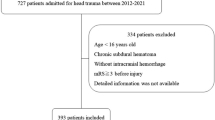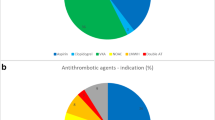Abstract
Background
Anticoagulant use prior to trauma has been associated with increased incidence of traumatic brain injury (TBI), intracranial hemorrhage (ICH) progression, and mortality. Prothrombin complex concentrates (PCCs) are commonly used as off-label treatments for factor Xa inhibitor-associated life-threatening hemorrhage. At this time, there is no consensus regarding appropriate indication, target dose, or outcomes of PCC administration in patients presenting with traumatic ICH. This study seeks to evaluate the impact of reversal with PCC on hemorrhage progression and outcomes in patients with TBI on preinjury factor Xa inhibitors.
Methods
This single-center retrospective cohort study included patients ≥ 18 years presenting with an acute TBI of any severity on apixaban or rivaroxaban from September 1, 2016, to September 1, 2019. Patients were grouped on the basis of receipt of PCCs for reversal (i.e., reversal or no reversal). Exclusion criteria included spontaneous ICH or known coagulopathy. Propensity score matching was conducted with the following variables: age, Abbreviated Injury Scale (head) score, and Charlson Comorbidity Index score. The primary outcome was hemorrhage stability within 48 h. Secondary outcomes included degree of hemorrhage progression, in-hospital mortality, discharge disposition, and incidence of thromboembolic events.
Results
Of the 115 patients meeting inclusion criteria, 84 were included in the propensity score matched data set. Baseline characteristics, comorbidities, and TBI severity were similar. The majority of patients in the reversal group (35 [83.3%]) and the no reversal (NR) group (40 [95.2%]) experienced a mild TBI (admission Glasgow Coma Scale score of 14 to 15). In the reversal group, patients received 34.3 units/kg activated PCC, 30.5 units/kg four-factor PCC, or 54.9 units/kg four-factor PCC and activated PCC on average. There was no difference observed in the incidence of hemorrhage progression (10.8% NR vs. 15.0% reversal; p = 0.739) or in median change in ICH volume (0 mL NR vs. 1 mL reversal; p = 0.2199) between groups. Additionally, reversal did not affect in-hospital mortality (3 [7.1%] NR vs. 4 [9.5%] reversal; p > 0.999). One patient in the reversal group developed a deep vein thrombosis (DVT) during the hospitalization; however, this did not result in a statistically significant difference in the occurrence of DVT (p > 0.999).
Conclusions
This study demonstrated that PCC used for the treatment of factor Xa inhibitor-associated ICH related to mild TBI did not significantly impact the incidence or degree of hemorrhage progression, and PCC treatment did not result in increased thromboembolic events.

Similar content being viewed by others
References
Centers for Disease Control and Prevention. Surveillance Report of Traumatic Brain Injury-related Emergency Department Visits, Hospitalizations, and Deaths—United States, 2014: Centers for Disease Control and Prevention, U.S. Department of Health and Human Services; 2019. https://www.cdc.gov/traumaticbraininjury/pdf/TBI-Surveillance-Report-FINAL_508.pdf.
Scotti P, Seguin C, Lo BWY, de Guise E, Troquet JM, Marcoux J. Antithrombotic agents and traumatic brain injury in the elderly population: hemorrhage patterns and outcomes. J Neurosurg 2019:1–10.
Allison TA, Lin PJ, Gass JA, et al. Evaluation of the use of low-dose 4-factor prothrombin complex concentrate in the reversal of direct oral anticoagulants in bleeding patients. J Intensive Care Med. 2020;35(9):903–8.
Sheikh-Taha M. Treatment of apixaban- and rivaroxaban-associated major bleeding using 4-factor prothrombin complex concentrate. Intern Emerg Med. 2019;14(2):265–9.
Panos NG, Cook AM, John S, Jones GM, Neurocritical Care Society Pharmacy Study. Factor Xa inhibitor-related intracranial hemorrhage: results from a multicenter, observational cohort receiving prothrombin complex concentrates. Circulation 2020;141(21):1681–9.
Castillo R, Chan A, Atallah S, et al. Treatment of adults with intracranial hemorrhage on apixaban or rivaroxaban with prothrombin complex concentrate products. J Thromb Thrombolysis. 2021;51(1):151–8.
Engelbart JM, Zepeski A, Galet C, Policeni B, Skeete DA, Faine BA. Safety and effectiveness of Factor Eight Inhibitor Bypassing Activity for direct oral anticoagulant-related hemorrhage reversal. Am J Emerg Med. 2019;37(2):214–9.
Sheikh-Taha M, Crawley RM. Reversal of apixaban and rivaroxaban using activated prothrombin complex concentrates in patients with major bleeding. Am J Cardiovasc Drugs. 2020;20(3):295–9.
Frontera JA, Lewin JJ 3rd, Rabinstein AA, et al. Guideline for reversal of antithrombotics in intracranial hemorrhage: a statement for healthcare professionals from the neurocritical care society and society of critical care medicine. Neurocrit care. 2016;24(1):6–46.
Harris PA, Taylor R, Minor BL, et al. The REDCap consortium: Building an international community of software platform partners. J Biomed Inform. 2019;95:103208.
Harris PA, Taylor R, Thielke R, Payne J, Gonzalez N, Conde JG. Research electronic data capture (REDCap)–a metadata-driven methodology and workflow process for providing translational research informatics support. J Biomed Inform. 2009;42(2):377–81.
Tomaselli GF, Mahaffey KW, Cuker A, et al. 2020 ACC expert consensus decision pathway on management of bleeding in patients on oral anticoagulants: a report of the American College of Cardiology Solution set oversight committee. J Am Coll Cardiol. 2020;76(5):594–622.
Dybdahl D, Walliser G, Chance Spalding M, Pershing M, Kincaid M. Four-factor prothrombin complex concentrate for the reversal of factor Xa inhibitors for traumatic intracranial hemorrhage. Am J Emerg Med. 2019;37(10):1907–11.
Funding
There was no funding for this project.
Author information
Authors and Affiliations
Contributions
Authors GEC, LAH, JCM, JHG, and ASR contributed to the initial design, data collection, drafting, and review of the final manuscript. Authors ASR and GEC were also involved with data analysis.
Corresponding author
Ethics declarations
Conflicts of interest
Author JCM is currently employed by Amgen. At the time of study development and conduct, JCM was not affiliated with Amgen. Amgen does not have a role in this project.
Ethical approval/informed consent
This project is institutional review board approved and complies with ethical guidelines.
Additional information
Publisher's Note
Springer Nature remains neutral with regard to jurisdictional claims in published maps and institutional affiliations.
Rights and permissions
About this article
Cite this article
Cooksey, G.E., Hamilton, L.A., McMillen, J.C. et al. Impact of Factor Xa Inhibitor Reversal with Prothrombin Complex Concentrate in Patients with Traumatic Brain Injuries. Neurocrit Care 37, 471–478 (2022). https://doi.org/10.1007/s12028-022-01521-3
Received:
Accepted:
Published:
Issue Date:
DOI: https://doi.org/10.1007/s12028-022-01521-3




